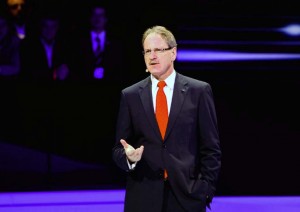More than two decades after its well-publicized debut, Infiniti remains a brand without a clear identity or well-defined mission. But all that could soon change.
The Nissan luxury brand has moved its headquarters from Japan to Hong Kong and hired on long-time Audi executive Johan de Nysschen as it new global chief executive. His challenge at Infiniti is not unlike what he faced at Audi, says the South African-born de Nysschen, taking an also-ran automaker and turning it a serious, top-tier contender.
“My goal is to unlock the potential of this brand,” de Nysschen told TheDetroitBureau.com during an interview in Pebble Beach, California prior to the annual Concours d’Elegance. “One of the things I bring to the table,” he added, “is I’m willing to challenge” the established order.
That is, of course, what Infiniti originally set out to do in 1989 when it became one of two Japanese luxury brands boldly challenging the likes of BMW and Mercedes-Benz. The other, Toyota’s Lexus marque, quickly proved its mettle, surging to the top of the sales charts and setting new benchmarks for quality, reliability and comfort. Infiniti, however, initially seemed rushed to market and has spent the two decades since trying to find its own niche.
It’s not been without success. The FX and smaller EX models pushed the boundaries of crossover design. The G-Series sedan, coupe and convertible models have helped Infiniti sharply ramp up sales. But the maker still doesn’t have a clear image in the market and while its German competitors, in particular, are rapidly expanding their product portfolios there are huge gaps in the Infiniti line-up.
The recent addition of the JX, a 3-row crossover, has helped. “We hadn’t been a family brand” until now, said Ben Poore, U.S. general manager for Infiniti. “This is bringing in new buyers and is becoming our second volume car.”
The JX features a crescent shaped kick to its rear window pillar, a new signature look that will reappear on other future models, including the next-generation G-cars, those about a year from launch. But one of the challenges for de Nysschen will be to create an even more unified look and feel for the brand – and to fill in some of those white spaces.
Some new models are already in the works. Poore confirmed that Infiniti will get a battery-electric vehicle, the LE, sometime in 2014. It shares many of the underlying components and the basic platform of the more mainstream Nissan Leaf – though the LE will have a more sporty shape and better performance, Infiniti executives have hinted.
At the Pebble Beach Concours, Infiniti staged the North American debut of its Emerg-E show car, a battery-electric concept that made a splash when it was originally unveiled in Europe. While Poore said it would be a “dream” to get a production version of the Emerg-E, it is clearly going to be de Nysschen’s call.
For the moment, the new chief executive isn’t ready to make that call. He has been on the job barely seven weeks and has spent much of that managing the move from suburban Washington, D.C., where Audi of America was headquartered, as well as meeting with Nissan Motor Co. CEO Carlos Ghosn, Infiniti dealers and others trying to get a better feel for the Infiniti brand’s capabilities and needs.
One thing de Nysschen said has made him comfortable in the new job is his recognition of the “absolutely remarkable competence” available to Infiniti. While the brand will be gaining much more autonomy as it moves its headquarters to Hong Kong it will still have access to the broad R&D capabilities of its parent, Nissan.
But the key to Infiniti’s long-term success – and why he took the job – is the decision to “invest in our own products and set up a distinct company (that will) shape things at a global level,” said de Nysschen.
One of the reasons for the move to Hong Kong was to place some physical distance between Infiniti and Nissan. But another was to place the luxury brand closer to China which is rapidly challenging the U.S. as the world’s largest luxury market. Infiniti has long been focused on the States but, going forward, its strategy – and its products – will be more global, stressed the new CEO.
“It stands to reason we will have to have products for the Chinese market,” as many luxury competitors have been coming up with, noted de Nysschen.
Infiniti won’t completely differentiate itself from its past nor break entirely from Nissan. The parent company’s CEO Carlos Ghosn is a major proponent of electric propulsion and the launch of the LE will be as significant for Infiniti as the debut of the Leaf was for Nissan.
“Electrification is (targeting) an important market,” de Nysschen said during a long discussion. “I think Infiniti will be spearheading that and it will provide a competitive advantage for us.”
But it will be only a part of the process of building out the “new” Infiniti.
“We have to define what the brand stands for,” he adds, noting that will be different, at least to some degree, from what Infiniti represented before.

